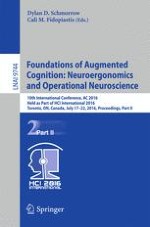2016 | OriginalPaper | Chapter
Intelligent Tutoring Gets Physical: Coaching the Physical Learner by Modeling the Physical World
Author : Benjamin Goldberg
Published in: Foundations of Augmented Cognition: Neuroergonomics and Operational Neuroscience
Publisher: Springer International Publishing
Activate our intelligent search to find suitable subject content or patents.
Select sections of text to find matching patents with Artificial Intelligence. powered by
Select sections of text to find additional relevant content using AI-assisted search. powered by
